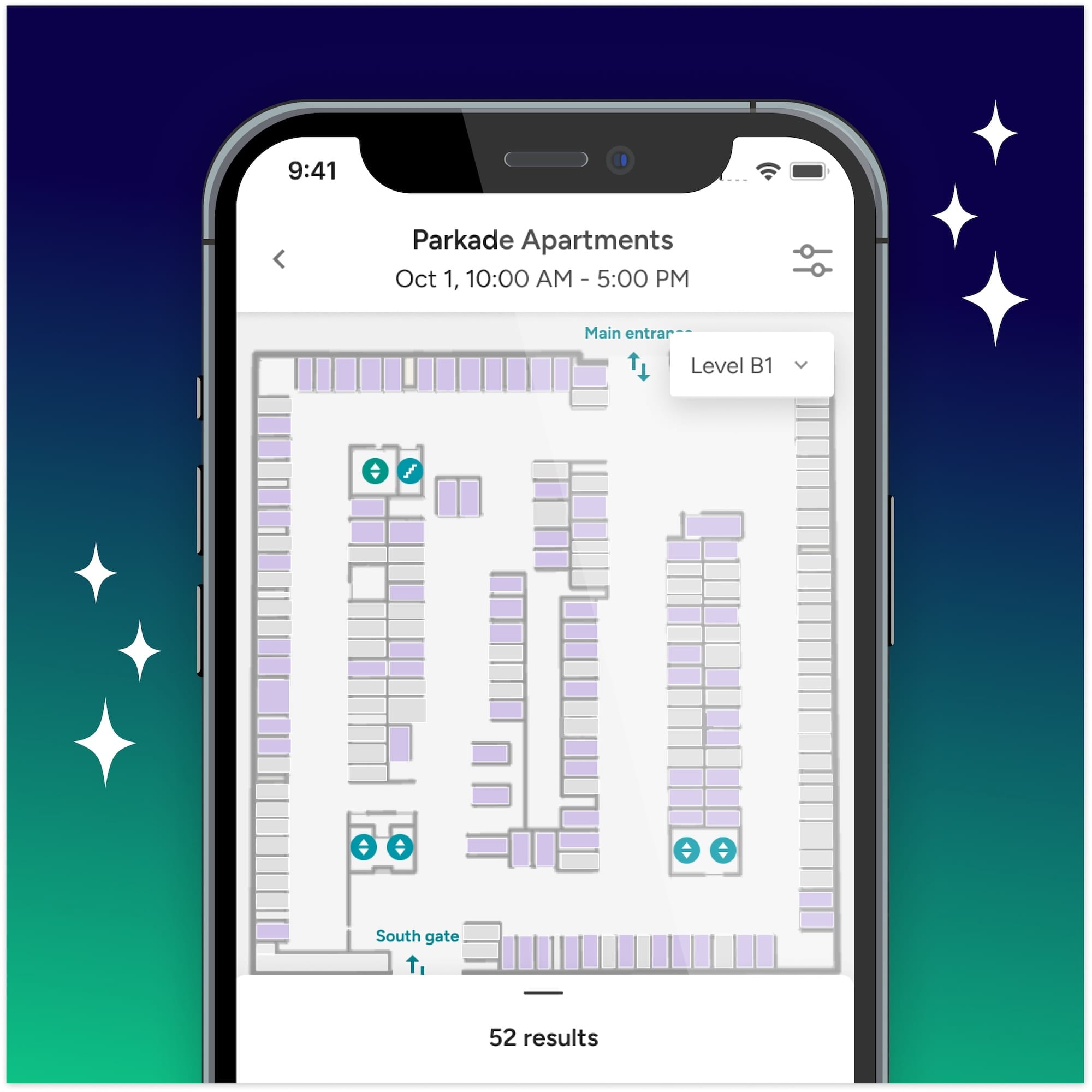%2520(3).png)
%2520(3).png)
TABLE OF CONTENTS
In the future, it’s looking increasingly likely that most vehicles will — eventually — be electric at some point. That means every single parking spot will have some level of demand for an EV charger.
The ideal buildings should strive for is making all chargers:
How do multifamily buildings solve this burgeoning need? Well, for starters, buildings will need to install more EV chargers to attract and retain tenants (or perhaps just to follow evolving EV laws).
Chargers, however, are very expensive.
Smart EV chargers (the fancy “networked” kind that can track electricity and accept payments) can cost many thousands of dollars each. Chargepoint’s CT4021 unit is $7,210 alone — even with two arms, that’s $3,600 per charging arm.

When you add the cost of wiring, electrical upgrades, permits and labor, adding EV chargers to a large building can easily cost up to $20,000 per charger.
Because of the high costs involved, almost no large building has — or is planning to install — EV chargers in every single parking spot. Instead, ensuring all residents can access a charger is increasingly the path most buildings choose to follow.
And since chargers are so expensive, highly utilized chargers will cost buildings far less on a per-hour-used basis than a charger that is only used a few hours each week.
So what’s a building to do? Unless they want to ignore the growing need for charging, there’s two options: (1) Install a charger at every parking spot or (2) ensure that every tenant has access to an EV charger.
Once a building decides to install chargers, there are two options when it comes to where to locate them:
In condo buildings, especially those that are already built, installing chargers in assigned parking spaces may be the only option. And at offices and apartments buildings, adding EV chargers to assigned parking may still be desirable, because tenants with EVs will pay significantly more for those spots.
Chargers in assigned parking spaces are inherently problematic, though, because that limits who can access the charge to essentially one person. And installing the chargers in communal spots doesn’t come close to creating an ideal charging experience either, as those spots can be unreliable.
Many buildings have found that unmanaged communal “EV parking” spots in front of EV chargers get easily abused. Many EV owners simply abuse these spots and use them as their personal parking while they are not using the chargers. Or even worse, non-EV owners realize the spots are first-come, first-serve and park combustion-engine vehicles whenever they run out of non-EV parking.

So, what’s a building to do? In the end, it doesn’t actually matter too much whether chargers go into communal or assigned parking spots. What matters is that the building follows a few best practices, to ensure chargers are highly utilized.
EV chargers can easily be made reservable, priced and shared by using the Parkade app.

Don’t make the mistake of having ordinary communal EV parking.
Many buildings try this approach, only to realize it gets abused. That often causes them to impose rules, like setting 4hr limits, only to realize that further frustrates EV owners who can’t always come back to move their car.
Instead, use Parkade to manage your communal EV parking. This allows buildings to make their EV spots reservable, predictable, priced and highly utilized.
Buildings can place an hourly price on parking in EV parking spots — which both helps recoup the costs of the charger, and helps serve as the single-best disincentive to not park in the EV parking spots for longer than needed. That can vastly increase charger utilization and allow buildings to install fewer chargers.
Even better, buildings can include the cost of charging as part of the parking fees. Many buildings have installed networked chargers, like the Chargepoint unit above, so that EV owners can be billed precisely for the electricity they use.
This is nice in theory, but has significant downstairs. Networked chargers are magnitudes more expensive than a “dumb” charger, and networks go down. Brett Skolnick, an EV owner at Electra condos in San Diego, reported that “Our single-biggest problem for EV owners has been connectivity to the Chargepoint servers — it’s been ongoing on for the last months.”
Additionally, requiring reservations brings predictability and reliability to your EV parking. Parkade also sends notifications when a tenant’s reservation has begun and ended, ensuring vehicles are moved promptly and on time.
This approach should allow any building to see more charger utilization with fewer chargers.

At buildings that install EV chargers in assigned parking spots, don’t install the charger and hope for the best (or hope that the parking spot assignee will just be nice and share it).
Skolnick saw this issue at Electra in San Diego, where even 97 EV chargers weren’t enough for the building’s EV owners, as they were all located in assigned parking spaces — and new owners had moved in with EVs and didn’t have an assigned parking spot with an EV charger.
Charger availability was such a serious issue, the building was pursuing the installation of even more expensive chargers to solve the problem.
Instead, buildings like Electra can encourage those with EV chargers in their assigned parking spots to make their spot available to other residents via the Parkade app when not in use, accomplishing a similarly high utilization as if the charger were in a communal spot.
As Skolnick told us, “Sharing spots will enable other EV users access to charging capabilities within the Electra community. This should hopefully encourage even more EV ownership prior to California’s 2035 mandate that all new cars be electric.”
With just a few taps on the screen, a resident with a dedicated charger and a parking spot can share their charger with other residents when their parking spot is not in use. In addition, owners of EV parking spots can charge others a small fee if they wish to help recoup costs.
Many buildings have discovered that EV chargers can be easy to share in assigned parking spots through Parkade, and you should be sure your building joins them.

For EV drivers, pulling up to a bank of chargers that are full of parked cars, especially parked cars that are not charging, can be an incredibly frustrating experience.
In the short term, it can cause them to miss an important meeting, a source of aggregation and wasted time, or it could cost them significantly more money by forcing them to park off-site in an expensive, public charger.
Long-term, repeated bad charging experiences can force them to rethink even owning an EV or rethink living or working in your building.
Resolving an issue as simple as providing enough EV chargers can improve tenant retention since every family would get an opportunity to properly charge their EV vehicles. Buildings could also charge higher rents and enhance the revenue source of selling electricity for EV charging.
The solution to the lack of EV parking spots and chargers is not simply to build more of them. A more efficient system is also needed to better manage those charging stations. Parkade is here to support buildings accommodate the ever-growing number of electric vehicles with an easy and cost-effective solution.
Using Parkade is an excellent way to manage the use of communal EV chargers and also defray the costs of installing the chargers in condo buildings (where families have to pay for all the installation costs). With this easy-to-use app, every building will be able to offer EV owners a much better and more reliable EV charging experience.
.jpg)
As parking management becomes increasingly digital, security becomes critical — and we’re excited to share that we've achieved a major security milestone.
Read Story
We’re thrilled to announce one of our most significant leaps forward this year: the launch of dynamic maps across our mobile and web applications.
Read Story
Now that AB 1317 is official, it’s time to brush up on the requirements and see how your properties stand to benefit.
Read Story